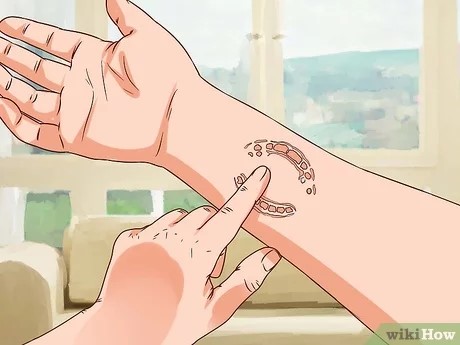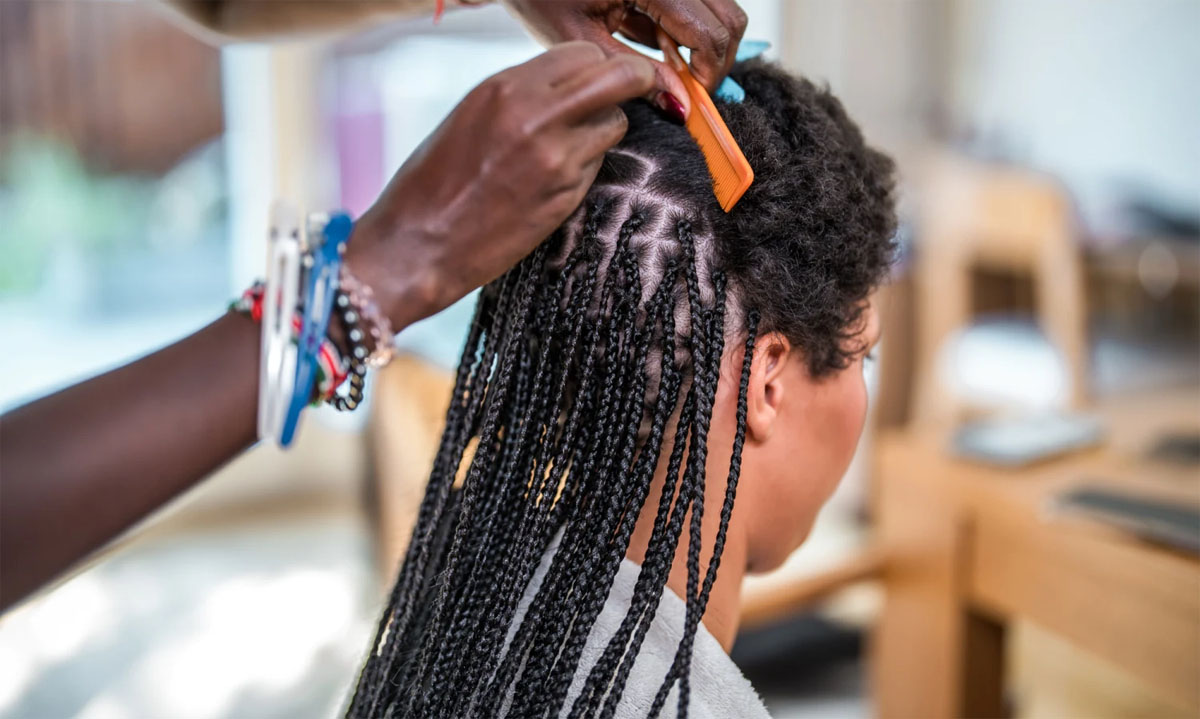Health
Why human teeth bite should not be neglected

A consultant oral and maxillofacial surgeon, Dr. Akanbi Olojede, says human bite could be potentially dangerous and should be treated with urgency to avoid life-threatening infection from microorganism or tetanus.
This is corroborated by experts at online health portal, Mayo Clinic; and scientists at the Cleveland Clinic, Ohio, USA.
Olojede noted that even if a bite victim had taken a tetanus injection before the incident, a booster injection should be administered to reduce the risk of tetanus infection.
Speaking in an interview with our correspondent, the consultant warned that there is no cure for tetanus, but that effort could only be made to manage complications that might arise until effects of the tetanus toxin wear off.
“If the booster injection is not taken, the human bite wound risks having superimposed infection due to the array of microorganisms present in saliva,” he stated.
Continuing, Olojede said, “Tetanus infection, which is also known as ‘lockjaw,’ can lead to painful muscle contractions, particularly of the jaw and neck muscles. It can cause respiratory distress that could lead to the bite victim’s death.
“Tetanus booster shot should be administered. Aside from cleaning the wound with strong antiseptic, and dressing it, the victim should be given antibiotics medication to protect against secondary infection by other bacteria.”
According to Mayo Clinic, human bites can be as dangerous as or even more dangerous than animal bites because of the types of bacteria and viruses contained in the human mouth. Human bites that break the skin can become infected, the portal adds.
It advised that a victim of human teeth bite should seek emergency medical care, adding, “If you haven’t had tetanus injection within five years, your doctor may recommend a booster. In this case, get the booster injection within 48 hours of the injury.”
Again, experts at Cleveland Clinic say that complications from a human bite can be very serious, including severe infection and permanently damaged bones, joints and/or tendons.
“It’s unlikely that a human bite will be fatal, especially if you seek out proper medical care, particularly around the infection,” the clinic counsels.
According to Wounds, a peer-reviewed journal focusing on wound care and wound research, human bites are the third most common bite wound diagnosed in emergency departments, after dog and cat bites.
It noted that management of human bite can be challenging, given the high risk of infection associated with multi-organism-rich oral flora.
Recognition and early aggressive treatment are essential steps in preventing infections and other associated complications, the journal emphasised.
Also, Medscape, a website providing access to medical information for clinicians, states that approximately 10-15 percent of human bite wounds become infected owing to multiple factors.
“The bacterial inoculum of human bite wounds contains as many as 100 million organisms per milliliter and is made up of as many as 190 different species. Many of these are anaerobes that flourish in the low redox environment of tartar that lies between human teeth or in areas of gingivitis.”
The portal notes that most injuries due to human bites involve the hands. “Hand wounds, regardless of the etiology, have a higher rate of infection than do those in other locations,” it stated; noting that infections associated with human bites are often far advanced by the time they receive appropriate care.
“Patients often wait until infection is well established before seeking medical treatment,” the portal laments.
Olojede, however, said that humans don’t have venom. “Basically, it is not an emergency per se. Human bite can’t be classified as being venomous or likened to a bite by dangerous animals.
“The most important thing is, what extent of damage has the bite inflicted on the victim and the intensity?
“But where danger comes in is when someone completely bites off the ear, upper or lower lip of an individual and spits it out, and some will go to the extent of swallowing it.
“In this case, the aim of the assailant is to disfigure the victim, which is causing grievous bodily harm. Such bites can be quite dangerous because of the bleeding that will occur.
“Such individuals should also be given pain killer because human bite could be very painful and unbearable by the following day, especially when it is deep and big.
“The risk of secondary infection is also high, but not the type that can lead to death. Nevertheless, treatment should commence immediately, beginning with a tetanus booster,” he emphasised.
Olojede, a former President, Nigerian Dental Association, further explained that the human mouth contains normal oral flora or bacteria, the absence of which can lead to death.
He said, “If we don’t have them, there is no way we can survive. We have them in our stomach, large and small intestines, and they have their functions. Someone without these organisms will come down with some terrible illness that can kill.”
According to News Medical Life Science, over 700 bacterial species co-inhabit healthily in the human mouth, and exist at diverse locations in the mouth, including hard palate, soft palate, teeth, tongue, and tonsillar areas.
It explained that most of the microorganisms that inhabit the oral cavity live in symbiotic relationship – where both the host and guest co-exist mutually for the benefit of each other.
Health
Scientists Warn Popular Hair Extensions Contain Cancer‑Linked Chemicals

Scientists Warn Popular Hair Extensions Contain Cancer‑Linked Chemicals
A new study has revealed that many popular hair extensions, including those made from human hair, contain chemicals linked to cancer, hormone disruption, and reproductive harm, raising serious health concerns for consumers worldwide. The findings, published in the American Chemical Society journal Environment & Health, represent the most comprehensive chemical analysis of this largely unregulated beauty product category to date.
Researchers from the Silent Spring Institute tested 43 hair extension products purchased from online retailers and local beauty supply stores. These included synthetic fibers and bio-based materials, such as human, banana, and silk hair. Using advanced non-targeted chemical analysis and high-resolution mass spectrometry, scientists detected over 900 chemical signatures, identifying 169 distinct chemicals. Most of the samples contained hazardous substances linked to cancer, hormone disruption, developmental harm, and immune system effects.
Among the dangerous compounds detected were phthalates, styrene, pesticides, flame retardants, tetrachloroethane, and organotins. Some chemicals, such as organotins, were found at levels exceeding European Union safety limits, while 17 chemicals identified in 36 products were linked to breast cancer and hormone disruption. Only two products tested were free of hazardous chemicals and labeled “non-toxic”.
READ ALSO:
- Keyamo Defends APC Amid Public Debate, Says Party ‘Not Made Up of Saints’
- Lagos Police Arrest Officers After Fatal Alagbado Shooting Amid Public Outcry
- Armed Bandits Kill 30, Kidnap Villagers in Zamfara Attack
Lead author Dr. Elissia Franklin said the study highlights the disproportionate exposure risk faced by Black women, who use hair extensions at much higher rates than other demographic groups. Surveys show that more than 70 percent of Black women reported wearing extensions at least once in the past year, compared with fewer than 10 percent of women from other racial or ethnic groups. Franklin explained that extensions are often worn for cultural expression, personal style, and convenience, yet users are largely unaware of the health risks posed by prolonged chemical exposure.
Because hair extensions rest directly against the scalp and neck, wearers may experience extended skin contact, and heating during styling can release chemicals into the air, leading to inhalation exposure. The study also found that manufacturers rarely disclose the full list of chemicals used to make extensions flame-resistant, waterproof, or antimicrobial, leaving consumers in the dark about potential hazards.
Consumer advocates are calling for stricter regulation, mandatory ingredient disclosure, and safer product alternatives. With the global hair extension market projected to exceed $14 billion by 2028, experts warn that millions of users could face cumulative exposure to toxic chemicals unless companies and regulators take action.
Dr. Franklin concluded: “These findings make clear that stronger oversight is urgently needed to protect consumers and push companies to invest in making safer products. No one should have to choose between cultural expression, convenience, and their health.”
Scientists Warn Popular Hair Extensions Contain Cancer‑Linked Chemicals
Health
Lassa Fever Deaths in Nigeria Rise to 51 After 15 Killed in Early February – NCDC

Lassa Fever Deaths in Nigeria Rise to 51 After 15 Killed in Early February – NCDC
Nigeria is facing a rising Lassa fever outbreak in 2026, with 15 deaths recorded in the first week of February, pushing the total fatalities from confirmed cases to 51 between the first and sixth epidemiological weeks, the Nigeria Centre for Disease Control and Prevention (NCDC) has reported. This reflects the continued severity of the viral haemorrhagic disease. The 15 deaths reported between February 2 and 8 translate to a Case Fatality Rate (CFR) of 21.3 per cent, higher than the 19.4 per cent recorded during the same period in 2025, despite a decline in overall suspected cases compared to last year.
Two healthcare workers were also infected in week six of the outbreak, highlighting the ongoing risks faced by frontline responders. Cumulative data for 2026 show 1,034 suspected cases, 240 confirmed cases, and four probable cases, spread across 10 states and 42 Local Government Areas (LGAs). For comparison, during the same period in 2025, Nigeria recorded 1,913 suspected cases, 413 confirmed infections, and 80 deaths across 11 states and 63 LGAs, showing a reduction in suspected cases but persistence of high fatality rates.
READ ALSO:
- Mob Kills Injured Motorcycle Rider After AK‑47 Rifles, Ammunition Found in Crash Scene
- Tacha Condemns False Rape Allegations After Mirabel Admits Fabrication
- UK Court Hands Life Sentence to Nigerian Teen for Knife Attack Killing
In the latest reporting week alone, 15 deaths occurred from 74 confirmed infections out of 271 suspected cases, resulting in a weekly CFR of 20.3 per cent. Confirmed cases increased from 44 in epidemiological week 5 to 74 in week 6, indicating a week-on-week rise in infections. The new confirmed cases were reported across eight states — Taraba, Ondo, Bauchi, Edo, Benue, Nasarawa, Kogi, and Ebonyi — affecting 24 LGAs.
Data analysis shows that 89 per cent of confirmed infections in 2026 are concentrated in four high-burden states: Bauchi (38%), Taraba (22%), Ondo (20%), and Edo (9%), while the remaining 11 per cent of cases were reported from six other states. The outbreak predominantly affects people aged 21 to 30 years, although cases range from 1 to 74 years, with a median age of 29 years. The male-to-female ratio among confirmed cases stands at approximately 1:0.7.
To manage the outbreak, the NCDC has activated the National Lassa Fever Multi-Partner, Multi-Sectoral Incident Management System (IMS) to coordinate surveillance, case management, laboratory support, and risk communication across affected states. The agency has urged citizens to adopt preventive measures such as improving sanitation and hygiene, practicing rodent control, ensuring early presentation of suspected cases at health facilities, and cooperating with public health authorities. The NCDC emphasised that timely intervention, early treatment with Ribavirin, and community awareness are critical to reducing fatalities and containing the outbreak.
Lassa Fever Deaths in Nigeria Rise to 51 After 15 Killed in Early February – NCDC
Health
Ramadan Health Tips: Six Ways to Stay Hydrated While Fasting

Ramadan Health Tips: Six Ways to Stay Hydrated While Fasting
Staying hydrated during Ramadan is essential for maintaining energy, focus, and overall well-being while observing long hours of fasting. Health experts warn that poor hydration can lead to fatigue, headaches, dizziness, and reduced concentration. Below are six essential, numbered tips to help you stay properly hydrated throughout the holy month:
1. Drink Enough Water Between Iftar and Suhoor
Ensure you consume 6–8 glasses of water between Iftar and Suhoor. Spread your intake gradually instead of drinking large amounts at once, allowing your body to absorb fluids effectively.
2. Break Your Fast With Water
Start Iftar with water to quickly replace fluids lost during the day and prepare your digestive system for food. Avoid sugary or carbonated drinks at this stage, as they can increase thirst later.
READ ALSO:
- Tinubu Urges Senate to Confirm Yusuf for NAHCON, Marafa for INEC
- Galatasaray Stun Juventus 5–2 in UEFA Champions League
- Vinicius Jr’s Wonder Goal Gives Real Madrid Victory Over Benfica
3. Eat Water-Rich Foods
Include fruits and vegetables with high water content, such as watermelon, oranges, cucumbers, tomatoes, lettuce, and soups. These foods support hydration while providing essential nutrients.
4. Reduce Salty, Spicy, and Fried Foods
Limit foods high in salt, oil, and spices, especially at Suhoor, as they increase thirst and can cause dehydration during fasting hours.
5. Limit Caffeine Intake
Reduce consumption of coffee, tea, and energy drinks, as caffeine has a diuretic effect that causes the body to lose more fluids. If taken, balance it with extra water.
6. Never Skip Suhoor
Suhoor plays a crucial role in hydration and energy. Eat a balanced pre-dawn meal that includes water, fruits, vegetables, whole grains, and protein to help sustain you throughout the day.
Maintaining proper hydration during Ramadan fasting helps support digestion, boosts energy levels, and keeps the body functioning optimally throughout the holy month.
Ramadan Health Tips: Six Ways to Stay Hydrated While Fasting
-

 Business1 day ago
Business1 day agoDangote Opens Refinery Investment to Nigerians With Public Share Sale Plans
-

 Politics3 days ago
Politics3 days agoPeter Obi Launches ‘Village Boys Movement’ to Rival Tinubu’s City Boys Ahead of 2027
-

 Education2 days ago
Education2 days agoUTME: JAMB Clarifies Position on Hijab During Biometric Capture
-

 News3 days ago
News3 days agoPolice to Arrest TikToker Mirabel After She Recants False Rape Claim
-

 Politics18 hours ago
Politics18 hours agoTinubu Hails Wike as APC Dominates 2026 FCT Area Council Elections
-

 Education3 days ago
Education3 days agoOgun Gov Rewards Nigeria’s Best Primary School Teacher with Car, Bungalow
-

 Politics2 days ago
Politics2 days agoADC Defeats APC to Win First Polling Unit in FCT Area Council Election
-

 Entertainment3 days ago
Entertainment3 days agoTacha Condemns False Rape Allegations After Mirabel Admits Fabrication



